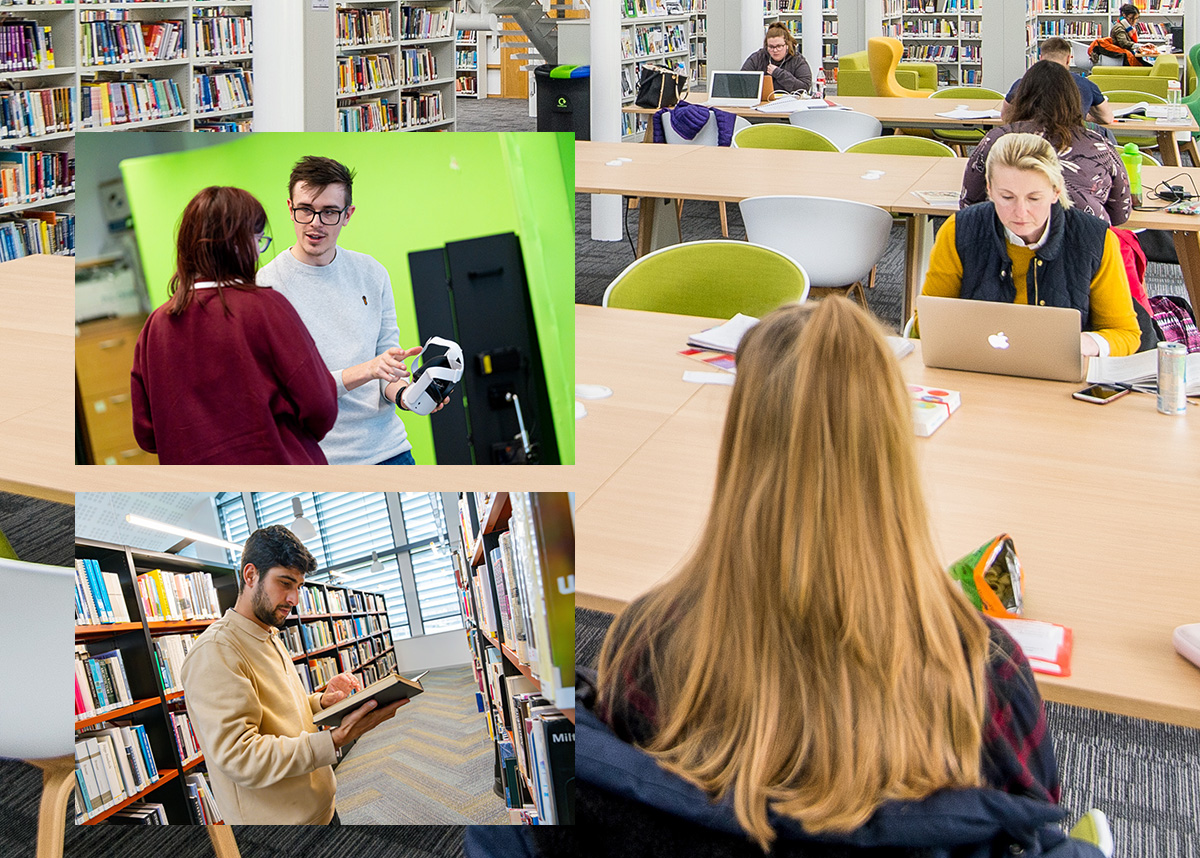


2023/24 Update
In 2023, it was decided to extend the existing 2021-23 digital strategy scope until 2026. The fundamental principles of the original strategy remain the same, the strategy itself was well received internally, but also externally within the sector. It was listed as one of five exemplar HE Digital Strategies in Jisc’s 2023 Digital Strategies in UK Higher Education report.
Extending a successful digital strategy is important because it can help a business or organisation to continue to grow and achieve its goals. Digital strategies are not static, and to stay relevant and competitive, they need to be regularly reviewed and updated. Additionally, as new technologies and trends emerge, it is important to assess how they can be incorporated into the existing digital strategy.
By extending our current successful digital strategy, UWTSD can:
Continue to meet the needs of students and staff
As digital needs and expectations evolve; it is important to ensure that the digital strategy continues to meet those needs by enhancing both the student and staff experience.
Continue to be at the forefront of Digital Services in the sector
By continuously improving the digital strategy, the university can stay ahead of competitors and maintain a competitive advantage.
Enhance institutional sustainability
A successful digital strategy can directly contribute to institutional sustainability through improved student and staff experience and more efficient business processes.
As well as refreshing the strategy aims, objectives and the relevant actions plans, it was also an opportunity to reflect on two key areas. Firstly, the strategy extension allows us to look at developing core values as part of it, something that can be consistent across Digital Services. Secondly, to also promote the significant work undertaken as part of the initial 2021-23 strategy, and these are both reflected within this strategy. Please note that whilst some of the language used in this strategy may be complex and at times technical, there is a section for definitions and terms within this document.
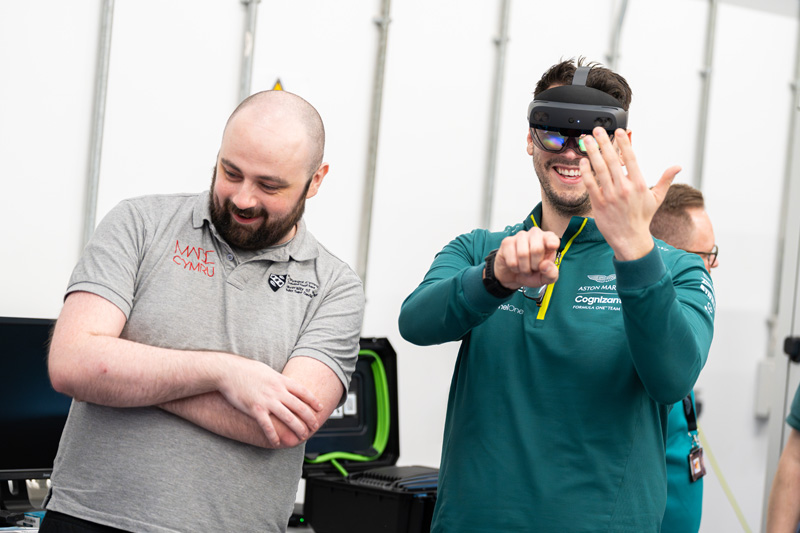


Strategy Approach
"People by default, technology by design"
This Digital Strategy aligns with our University’s Strategic Plan and Fee and Access Plans and is directly linked to key strategies such as the university’s Academic Success Strategy, Employability Strategy, Research and Innovation, Strategic Equality Plan and the Student Health and Wellbeing Strategy 2020 – 2024. The strategy will also look to align where possible with the FE colleges Digital Strategy as part of a wider UWTSD group approach.
As part of a golden thread approach, the digital strategy will also provide oversight of two key institutional strategies, the IT Strategy and the Library and Learning Resources Strategy. Both will support the digital strategy and ensure there is a golden thread from each strategy that leads into the digital strategy, which in turns leads directly to the institutional strategic plan, highlighting the direct influence these strategies have in delivering institutional aims and objectives.
At the heart of any digital strategy lies the fundamental belief that technology should be designed to serve people, not the other way around. This is the guiding ethos behind our digital strategy, which places people at the centre of all our digital initiatives. We believe that technology is a powerful tool that can help us achieve our goals, but it must be designed with people in mind. Our strategy is grounded in the principle of "people by default, technology by design", which means that we prioritise the needs of people in all our digital endeavours. By embracing this ethos, we aim to create digital solutions that are not only effective and efficient but also accessible, inclusive, and user-friendly. Our strategy seeks to leverage technology to enhance the human experience, while also ensuring that it is used responsibly, ethically, and sustainably.
For this strategy, we have set six high-level domain objectives, underpinned by a set of high-level measures of success that will allow us to measure the strategies impact. In addition to these, each unit within Digital Services will have clear action plans in place which will be updated annually to reflect the annual planning process, and which directly reference the measures of success, to allow us to monitor and review.
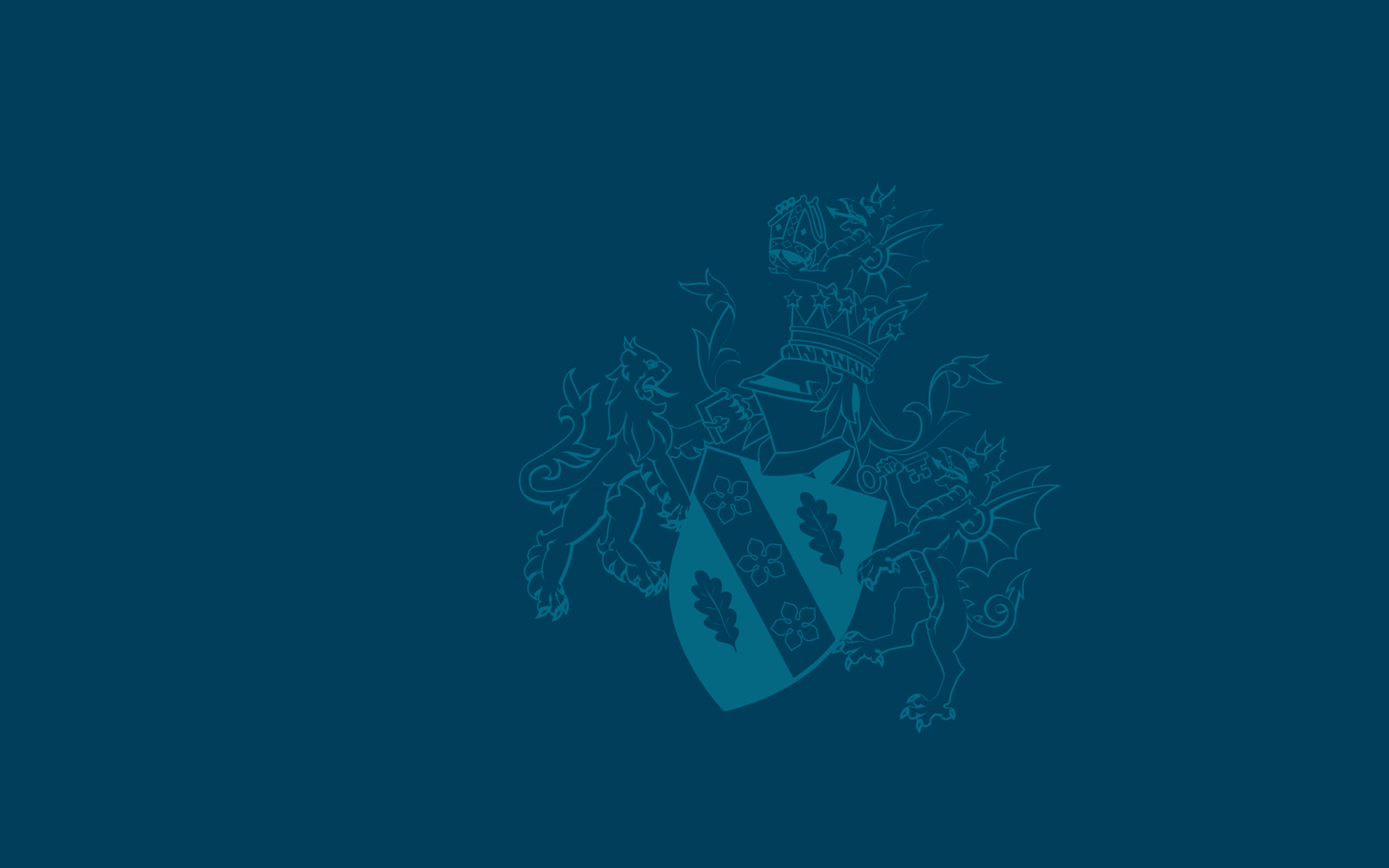
Our Journey, Purpose and Core Values


Our Journey
In early 2020 the University was heading towards the end of two key institutional strategies, the Learning and Teaching Strategy (2017-20) and the Information Technology Strategy (2017-20). It was decided that 2020 was an opportunity for a new approach to digital within the University and to align key strategies (Library & Learning Resources, IT&S, TEL, L&T) and to develop the institutions digital capability. A focus on developing a new Digital Strategy in 2020 was fostered and discussions had already started to take place.
At this point in time Covid came along and caused a huge digital shift in higher education, initial reactive work was complimented by a suite of initiatives to develop a foundation for future digital transformation. The creation of a new directorate – Digital Services – comprising of IT, TEL and LLR and along with it a new structure, as well as a digital framework for blended learning with supporting groups (EdTech and Blended Learning Leadership) helped lead towards the creation of the new institutional Digital Strategy in 2021.
The initial Digital Strategy ran from 2021-2023 and as part of our engagement approach (further details in section 2) for the extension of the strategy until 2026, it was a key priority to assess its impact and capture this feedback to inform the extended strategy.
It is also important to look to celebrate success where possible, with the work undertaken as part of the 2021-23 digital strategy a key enabler for the institution.
Some of the highlights include:
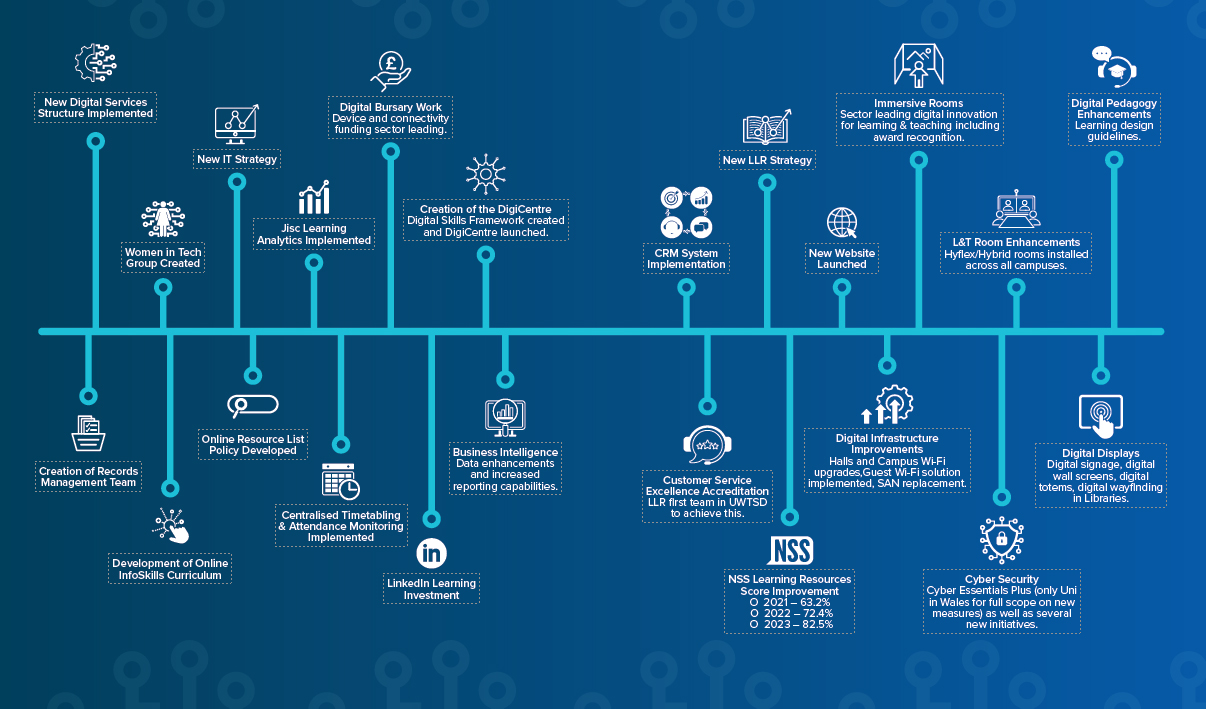
Enlarge highlights diagram (PDF)
- New Digital Services structure implemented.
- Creation of the DigiCentre – Digital Skills Framework created and DigiCentre launched.
- Digital Bursary work – device and connectivity funding sector leading.
- Immersive Rooms – sector leading digital innovation for learning & teaching including award recognition.
- Customer Service Excellence accreditation – LLR first team in UWTSD to achieve this.
- New IT Strategy.
- New LLR Strategy.
- L&T Room enhancements – Hyflex/Hybrid rooms installed across all campuses.
- Cyber Security – Cyber Essentials Plus (only Uni in Wales for full scope on new measures) as well as several new initiatives.
- CRM system implementation.
- New Website launched.
- Jisc Learning Analytics implemented.
- LinkedIn Learning investment.
- Women in Tech group created.
- NSS learning resources score improvement:
2021 – 63.2% | 2022 – 72.4% | 2023 – 82.5% - Digital Infrastructure improvements – Halls and Campus Wi-Fi upgrades, Guest Wi-Fi solution implemented, SAN replacement.
- Digital Displays – Digital signage, digital wall screens, digital totems, digital wayfinding in Libraries.
- Digital Pedagogy enhancements – learning design guidelines.
- Business Intelligence – Data enhancements and increased reporting capabilities.
- Development of Online InfoSkills Curriculum.
- Creation of Records Management Team.
- Online Resource List Policy developed.
- Centralised Timetabling & Attendance Monitoring implemented.

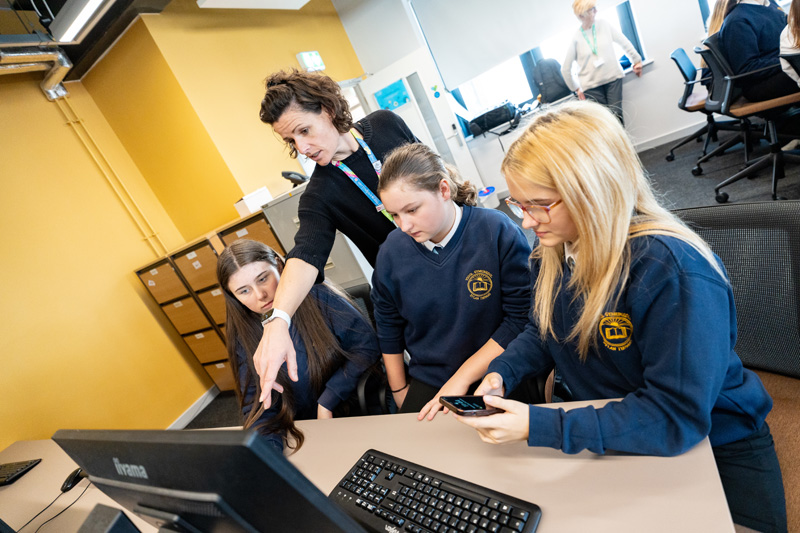
Our Purpose
This strategy will support all thematic and enabling strategies and frameworks across the organisation. This strategy aims to move beyond departmental boundaries by supporting and enabling digital transformation across the whole of the university, for Learning & Teaching, Research, Collaborative Partnerships and Professional Services. Central to the strategy are themes of change management, user engagement, partnership and collaboration and system ownership. We need to recognise and encourage good practice but acknowledge processes and practices that are not working well. These cultural elements will have a significant impact on the success of the strategy. We also need to celebrate the significant steps that we have taken over the last year that facilitate this strategy and underpin the further work that is required to digitally transform the institution.
This is a university wide strategic framework, an enabling and empowering roadmap approach that ensures that digital will be embedded at the heart of the institution. It aims to improve digital resilience, to move to a position of greater workflow transparency and openness. This in turn will support the wider agenda around staff and student wellbeing, while at the same time ensuring a higher level of resilience and sustainability of university infrastructure.

Our Core Values
Digital Services consists of four talented and unique teams that ultimately support the delivery of this strategy. Whilst each team has its own values, as part of the strategy process and the ongoing reflections from developing the Digital Services teams, it was important to look at developing some guiding principles around our values and approach. As such, the below core values have been created to assist not only to the delivery of the strategy but to provide a foundational approach to what we do and how we do it.
User-centric Approach
We commit to putting users at the heart of everything we do with our strategy approach of people by default, technology by design. This means understanding their needs, expectations, and the context of their use of our services to create effective and user-friendly solutions.
Innovation and Creativity
We value the unique ideas and perspectives that our diverse team brings to the table. We are committed to fostering an environment that encourages innovative and diverse thinking, that mistakes are learning opportunities and the use of creative solutions to solve complex problems.
Open Communication, Collaboration and Teamwork
We believe in keeping all lines of communication open across the units within Digital Services, across all levels of hierarchy and across all areas. Although different units, we collaborate across the directorate to share knowledge, achieve common goals, and create a trusting environment.
Continuous Learning and Improvement
We foster a culture of continuous learning and professional development. We see every challenge as an opportunity to grow and improve. We encourage feedback and use it constructively to better our services and our personal capabilities.
Agility and Adaptability
We value the ability to adapt to changes, to pivot when needed, and to work with agility and flexibility to meet our objectives and exceed expectations.
Inclusion and Diversity
We believe that a key strength lies in our diversity across the directorate. We are committed to creating an inclusive environment where everyone feels valued, heard, and respected.
Quality and Excellence
We strive for excellence in our work. We are dedicated to delivering high-quality services that meet or exceed our users’ expectations.
Data-Driven Decision Making
We value the power of data and leverage it to guide our decision-making process. We utilise data dashboards to display information that helps both our directorate and the institution make informed, effective, and impactful decisions. We also use this data to monitor key performance indicators and provide insight to measure the success of what we do.

How We Developed This Strategy


For the original 21-23 strategy, to identify objectives and shape the action plan we undertook an extensive consultation exercise with key stakeholders across the university. This engagement helped us understand the needs of our community and has ensured that we have crafted a strategy that reflects voices from across the university.
As part of the strategy extension work, we continued this approach, during the period of September to December 2023, significant stakeholder engagement took place with key stakeholders throughout the University. This process focused on looking back at the strategy, what worked and anything that didn’t. Whilst also looking forward as to what would be needed to support both staff and students.
Once again, this consultation phase directly helped define a realistic set of strategic objectives, whilst at the same time capturing a level of aspiration and ambition. The strategy aims to both manage expectations as well as empower the organisation to continue to transform into a digitally enabled institution.
The feedback from the consultation process has once again been overwhelmingly positive, with excellent engagement across several areas that have helped us to shape the strategy to take us into 2025. It is key that the strategy continues to be informed by this engagement to ensure endorsement from across the institution.
In total there were over 24 hours of engagement sessions across 14 areas within the university. Some of the themes from the engagement process are outlined below:
- Positive feedback on services across Digital Services with specific mentions to:
- Friendly staff, valued support.
- DigiCentre work.
- Immersive Rooms.
- Digital Learning and Academic Office work.
- Operational improvements identified:
- Length of time for requests.
- Printing – theme of basic issues.
- New starter process (right kit at start) – positive feedback on recent changes though.
- Communications approach – how do we ensure we get the messages out (including selling successes).
- Light-switch approach – devices that just work and connect.
- Continued support for areas looking at digitisation approaches, as well as key institutional projects for new digital systems.
- Developing and supporting new digital innovations such as AI.
- Continued development of the DigiCentre’s approach to Digital Skills.
- Continued support around online learning, from content development support (digital pedagogy) to commercial VLE offerings.
- Further development of the business intelligence data available, to present clear institutionally agreed KPIs that are easily digestible via dashboards and equivalent.

How We Will Monitor
and Review The Strategy /
UWTSD Group Impact


How We Will Monitor and Review The Strategy
The continued use of the Digital Strategy Steering Group (DSSG) is planned to monitor and review the strategy. This group consists of key internal stakeholders as well as external representation from the UWTSD FE Colleges and from Jisc.
As part of the 21-23 strategy, there was clear objective action plans which set out key priorities to support the strategy, aligned with an operational action plan. Whilst this approach will remain in this strategy, the high-level objectives in the strategy will now be aligned to clear values that will be used to measure success. This will allow us to easily report on the objectives for the strategy and how we are meeting them.
The output from the DSSG will be regularly reviewed by the Professional Services Senior Leadership team, as well as being made available for various committees and boards as and when required.
A range of internal and external benchmarking activities will also be undertaken to evaluate the success of the strategy as part of the steering group and wider reporting of the strategies success. We will continue to utilise outputs from the annual NSS survey, as well as the staff and student JISC Digital Experience Insights Surveys to measure how our students and staff are using our technology, what is making a difference and where improvements can be made.

UWTSD Group Impact
The Strategy will continue to foster engagement with the FE Colleges as part of the wider UWTSD group approach. As part of the strategy development process, we have reviewed the existing UWTSD FE Colleges Digital Strategy and, working with FE colleagues, will continue with high-level cross-cutting initiatives that we work together on as part of a group approach.
Teaching and Learning
Develop engagement on digital teaching and learning through shared best practice and FE/HE approaches.
Digital Skills
Work closely on a consistent approach to digital skills development for both FE and HE.
Cyber Security
Develop engagement on Cyber Security approaches to support Digital Transformation.
Systems Integration
Review opportunities to align and integrate core IT Systems to facilitate future working approaches such as shared campus facilities.
Building a Digital Group Community
Underpin the approaches above by building a digital UWTSD group community to enhance engagement on digital transformation.

Domain Objectives and Action Plan
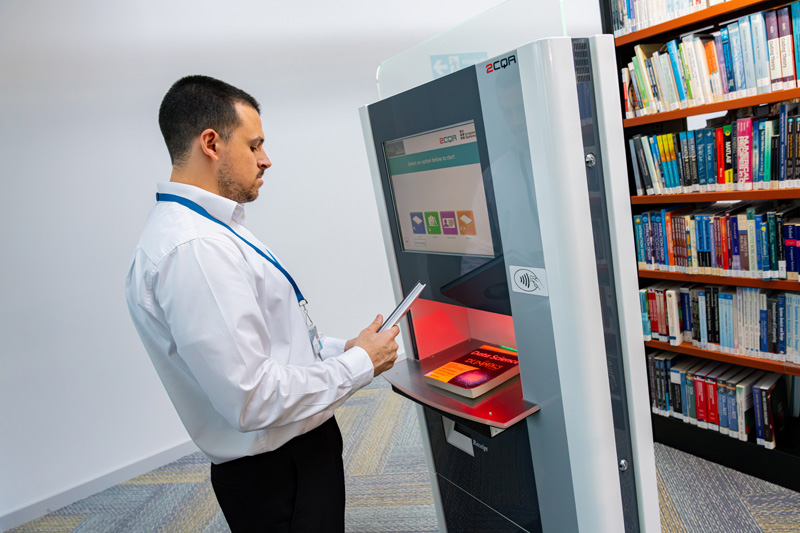
To achieve digital transformation and support the University’s strategic priorities, six domain themes have been identified. These themes have been developed in collaboration with academic staff, professional services staff, and students. They seek to address ‘pain points’ and areas for further development identified in the consultation process, but also reflect best practice internally and across the sector and aim to support the university in becoming a digital leader within the higher education community.
To ensure alignment and consistency with the wider organisational strategy, each of the objectives have been mapped to the relevant institutional strategic priority, and which are summarised below.

University Strategic Priorities
- Strategic Priority 1 – Putting Learners First
- Strategic Priority 2 – Excellence in Teaching, Scholarship and Applied Research
- Strategic Priority 3 – Creation of Opportunities through Partnerships
- Strategic Priority 4 – A University for Wales
Digital Strategy Objectives
Domain 1 - Digital Connectivity
To provide a digital infrastructure that supports the university in providing educational excellence by ensuring robust, secure connectivity that is both futureproof, scalable and that is designed with sustainability in mind.
- Invest in our digital infrastructure, through new Wi-Fi technology, network switching, and upgrading interconnection speeds to improve reliability, resilience, and connectivity speed.
- Develop learning technologies and associated infrastructure across the university to ensure we support the digital agenda and stay at the forefront of HE Sector developments.
- Implement new bilingually available IT systems and solutions, along with the continuous improvement of existing systems to facilitate the university’s key objectives.
- Continue to develop our Cyber Security approaches and to ensure we meet Cyber Essentials Plus criteria for the whole institution to highlight the university’s best practice approach to cyber security.
Domain 2 - Digital Productivity
To enable staff to leverage digital tools and technology to increase personal productivity and streamline university operations, whilst at the same time enhancing the student experience.
- Continue our digitisation approach to help streamline and enhance university functions. Working in collaboration with student voice, academia, and professional services to ensure we continue to prioritise the most impactful developments and integrations.
- Facilitate improved data literacy and develop more meaningful data by building on our current report suite, with graphical reports, focussing on UWTSD KPIs to deliver a KPI dashboard that supports decision making for a wide range of stakeholders.
- Utilise advanced reporting data to allow early detection and prevention of reoccurring and shared issues, as well as the opportunity for the automation of common requests.
Domain 3 - Digital Learning
To provide high-quality digital learning experiences for students and faculty, including online courses, remote teaching and learning, and hybrid learning models.
- Focus on an integrated and class leading Virtual Learning Environment, learner analytics and engagement tracking solutions.
- Create inspirational and inclusive physical and digital spaces that will allow students to push the boundaries of their learning experience.
- Develop relevant frameworks and development opportunities to enhance digital pedagogy within the institution.
Domain 4 - Digital Inclusion
To ensure that all members of the university community have equal access to digital resources and technology.
- Utilising benchmarks such as NSS, we will develop further links with users to understand their needs and to capture feedback throughout their student journey.
- Supporting digital inclusion by helping develop a co-ordinated student engagement process, investing in and developing Enterprise Service Management (ESM) and Customer Relationship Management (CRM) systems.
- Work to ensure our collections and services are representative of our diverse student and staff community.
- Establish an institutional digital inclusion manifest and toolkit to measure our digital inclusion approach.
Domain 5 - Digital Capabilities
To enhance the digital capabilities of students and staff, enabling them to effectively use digital tools and technology in their work.
- To be a centre of excellence in digital skills development, putting both staff and students in the best position to make use of technology.
- Across all areas of Digital Services, create professional development opportunities for both staff and students through the development of digital skills training and workshops.
- Working with other university stakeholders, develop relevant content around digital services for the staff and student induction process, to ensure users have access to relevant information from day one.
Domain 6 - Digital Innovation
To foster a culture of digital innovation and creativity within the university, enabling the development of new ideas, products, and services.
- Develop new and innovative digital solutions to support new institutional initiatives.
- Research, develop and utilise new technologies such as AI to enhance services provided.
- Empower our community to engage with learning spaces in ways that drive knowledge creation and innovation.
By pursuing these six key domain objectives, the university can implement a strategy that leverages technology to enhance learning and teaching, increases productivity, promote inclusion and foster innovation.
Measuring Success
As noted within this strategy, our approach is to underpin the six high-level domain objectives with clear measures of success that will allow us to measure the strategies impact. Each unit within Digital Services will also have clear action plans in place which directly reference the measures of success, to allow us to monitor and review. These will also form part of the wider institutional annual planning process, with yearly updates to reflect the institutional priorities and approved plans.

Definitions and Terms
Digital Capabilities
Digital capability is the broad term used describe the skills, knowledge, and attitudes that individuals and organisations need if they are to thrive in today’s world.
DigiCentre
The UWTSD DigiCentre provides a gateway for staff and students to develop their digital skills utilising a range of tools, beginning with a selfassessment questionnaire to evaluate current digital skills levels, and offering training and development resources to build and develop on those skills.
Digital Inclusion / Exclusion / Poverty
Digital exclusion is when an individual or group are digitally disadvantaged due to societal barriers to skills development, connectivity, and accessibility.
Digital Literacy
Digital literacy means having the specific skills you need to live, learn, and work in a society where communication and access to information is increasingly through digital technologies like internet platforms, social media, and mobile devices.
Digital Resilience
Digital resilience can be defined as an organisation's ability to maintain, change, or recover technology-dependent operational capability.
Digital Skills
Digital skills are broadly defined as those needed to use digital devices, communication applications, and networks to access and manage information.
Digital Technology
Digital technologies are electronic tools, systems, devices, and resources that generate store or process data.
Digital Transformation
Digital transformation is the integration of digital technology into all areas of a business, fundamentally changing how you operate and deliver value. It is also a cultural change that requires organisations to continually challenge the status quo, experiment, and get comfortable with failure.

References
- Digital at the core: a 2030 strategy framework for university leaders
- Digital Strategy for Wales
- Digital Strategies in Higher Education: Making Digital Mainstream
- FE Colleges Digital Strategy 2021-2024
- Learning and teaching reimagined | JISC
- Student digital experience survey insights survey 2023: UK HE findings
- Teaching staff digital experience survey insights survey 2023: UK HE findings
- UWTSD Digital Framework for Blended Learning
- UWTSD DigiCentre Skills Framework
- UWTSD Strategic Plan 2023-2025
- UWTSD Academic Success Strategy
- UWTSD Employability Strategy
- UWTSD Research and Innovation Strategy 2022-2027
- UWTSD Strategic Equality Plan 2020-2024
- UWTSD Student Health and Wellbeing Strategy 2020-2024
- Well-being of Future Generations (Wales) Act 2015
